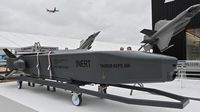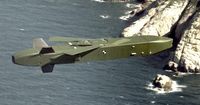The recent debate over the potential delivery of Germany's Taurus cruise missiles to Ukraine has been sparked by Friedrich Merz, the leader of the Christian Democratic Union (CDU) and likely future chancellor. Merz aims to provide Ukraine with the capability to disrupt Russian supply routes and prevent missile attacks from deep within Russia. However, he is now facing increasing pressure to take decisive action following the chancellor election.
Marie-Agnes Strack-Zimmermann, chairwoman of the Defense Committee in the European Parliament, argues that "Vladimir Putin does not want peace. On the contrary, Russian attacks on Ukraine have massively increased since the beginning of talks between Putin and US President Donald Trump." She insists that Merz should not make announcements on television but rather act as soon as he assumes the chancellorship. Strack-Zimmermann believes that only by putting military pressure on Russia can a ceasefire and a just peace for Ukraine be achieved.
The question of whether Germany should deliver the Taurus missiles has been a contentious issue in Berlin for years. While Merz and many other lawmakers from the Union have supported the idea, concerns have been raised primarily by members of the Social Democratic Party (SPD), who may form a coalition with the Union in the future. The SPD likely feels validated by the recent reactions to Merz's statements about the Taurus missiles. The Russian Foreign Ministry has warned that any Ukrainian attack using Taurus missiles on Russian targets would be considered a "direct involvement" of Germany in the conflict. Maria Sacharowa, a spokesperson for the ministry, stated, "A strike with these missiles against Russian facilities will be seen as Germany's direct involvement in the hostilities alongside the regime in Kyiv, with all the consequences that entails."
Merz suggested the delivery of Taurus missiles to Ukraine in coordination with European partners during a statement last Sunday. However, Strack-Zimmermann sees the Kremlin's response as nothing new, stating, "The verbal reaction from Russia regarding a possible Taurus delivery is as old as all the narratives sent from Moscow to Germany." The pressure is now mounting on Merz to turn his words into action, especially with the SPD facing internal dissent regarding the potential delivery of Taurus missiles.
Defense Minister Boris Pistorius (SPD), who is likely to remain in his position in a Merz cabinet, expressed caution regarding the Taurus delivery. He remarked, "There are good arguments for and against the delivery and use of Taurus," during an SPD event in Hannover. Meanwhile, US government officials and European representatives are working towards future discussions with Ukraine and Russia regarding a potential ceasefire. The urgency for these talks has increased, with US Secretary of State Marco Rubio stating in Paris that the United States could soon halt its peace efforts if there are no clear signs of an agreement.
US Vice President JD Vance expressed optimism about ending the war in Ukraine during a meeting with Italian Prime Minister Giorgia Meloni in Rome, saying, "As negotiations are ongoing, I don't want to preempt them, but we are optimistic that we can hopefully bring this brutal war to an end." The next round of negotiations with the US regarding the planned mineral agreement is set for April 24, 2025. Despite claims of progress in discussions about a potential peace settlement from the Russian leadership, attacks on Ukraine have continued unabated.
In a related development, former Ukrainian Ambassador to Germany, Andrij Melnyk, has called for a swift delivery of Taurus missiles. In an open letter to Merz published by "Welt am Sonntag," Melnyk urged the future chancellor to announce the immediate delivery of 150 Taurus missiles in the Bundestag on May 6, 2025—the day of his expected election—and to implement this quickly. He emphasized that the delivery of Taurus does not require coordination with partners or ultimatums to President Putin, stating, "One should simply deliver these inferno weapons, without ifs and buts, in order to stop the creeping advance of the Russians and fundamentally change today's war dynamics."
As the outgoing Chancellor Olaf Scholz (SPD) has firmly rejected any Taurus deliveries, fearing that such actions could draw Germany into the war, Merz has reaffirmed his willingness to supply long-range cruise missiles to Ukraine, albeit with the condition of coordinating with European partners. Melnyk's letter highlights the urgency of the situation, arguing that the future of not only Germany but also Ukraine and all of Europe hangs in the balance. He believes Merz has a historic opportunity to position Germany as a beacon of the free democratic world.
To effectively utilize the Taurus systems, Melnyk further suggests that the future black-red coalition should consider transferring 30 percent of available German fighter jets and helicopters from the Luftwaffe to Ukraine, including approximately 45 Eurofighters and 30 Tornados. This proposal comes amid increasing military tensions and the ongoing conflict that has been raging since February 2022, when Russia launched its aggression against Ukraine.
As discussions continue, the stakes remain high, and the international community watches closely to see how Germany will navigate this complex situation. With the potential for escalation in the war and differing opinions within German political circles, the decision regarding the Taurus missiles could have far-reaching implications for the future of European security and stability.








